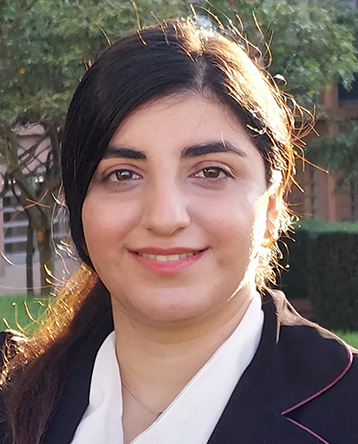NextM Seminar: Kiana Naghibzadeh and Srujana Rao Yarasi
March 31, 2023
12:30 p.m. ET
Scott 6142
March 31, 2023
12:30 p.m. ET
Scott 6142

Next Manufacturing Center seminars are open to Center members, as well as other interested members of the CMU community. Next Manufacturing Center Consortium members are able to participate online.
Speaker: Kiana Naghibzadeh, Ph.D. candidate, civil and environmental engineering (advisor: Kaushik Dayal)
Understanding observed distortions and residual stress in different additive manufacturing processes requires realistic models for studying the interaction between growth and thermomechanical stress. Modeling the mechanical behavior of growing solid bodies with surface growth, where mass is added at the boundary of the body, is challenging using standard Lagrangian (particle tracking) formulations, which are designed for situations with constant mass. An Eulerian (spatial) description of this problem enables mechanical modeling of growing solids by side-stepping the issue of mass addition. Using a transport equation to determine the evolution of the deformation gradient enables computing the stress of the solid in an Eulerian setting. A free energy-based approach provides a unified and thermodynamically-consistent framework to study the thermomechanics of a growing solid by coupling the developed mechanical model with a thermal model. Using the Eulerian approach enables modeling distortion of the printed solid in a large deformation setting on a fixed discretization which is not possible using the element birth and death method widely used in modeling additive manufacturing. Implementing this unified formulation in the open-source finite element framework FEniCS enables predicting warpage in fused deposition modeling of semi-crystalline polymers more realistically compared to available thermo-mechanical models with the assumption of infinitesimal deformation.
Speaker: Srujana Rao Yarasi, Ph.D. candidate, materials science and engineering (advisor: Tony Rollett)
 Metal powders are extensively used in additive manufacturing processes which necessitates standardized characterization methods for powder properties. The use of computer vision and machine learning tools in the additive manufacturing domain have enabled the quantitative investigation of qualitative factors like powder morphology, which affect the flowability in AM processes. Flowability is measured through rheological experiments conducted with the FT4 rheometer and the Granudrum, as well as the Hall Flowmeter. Convolutional Neural Networks (CNN) are used to generate feature descriptors of the powder feedstock, from SEM images, that describe not just the particle size distribution but also the sphericity, surface defects, and other morphological features of the particles. Powder property metrics are correlated to their performance metrics for several powder systems to characterize their performance in AM processes. This analysis approach is intended to be agnostic to the type of AM process and can be adapted to various powder forming techniques.
Metal powders are extensively used in additive manufacturing processes which necessitates standardized characterization methods for powder properties. The use of computer vision and machine learning tools in the additive manufacturing domain have enabled the quantitative investigation of qualitative factors like powder morphology, which affect the flowability in AM processes. Flowability is measured through rheological experiments conducted with the FT4 rheometer and the Granudrum, as well as the Hall Flowmeter. Convolutional Neural Networks (CNN) are used to generate feature descriptors of the powder feedstock, from SEM images, that describe not just the particle size distribution but also the sphericity, surface defects, and other morphological features of the particles. Powder property metrics are correlated to their performance metrics for several powder systems to characterize their performance in AM processes. This analysis approach is intended to be agnostic to the type of AM process and can be adapted to various powder forming techniques.
November 20 2025
12:30 PM ET
Next Manufacturing
Lunch and Learn: "Analytical Theory of the LPBF Keyhole Dynamics and Applications for Cost-Effective AM Monitoring Methods" with Haolin Liu, Ph.D. Candidate, Mechanical Engineering
Scott 6142